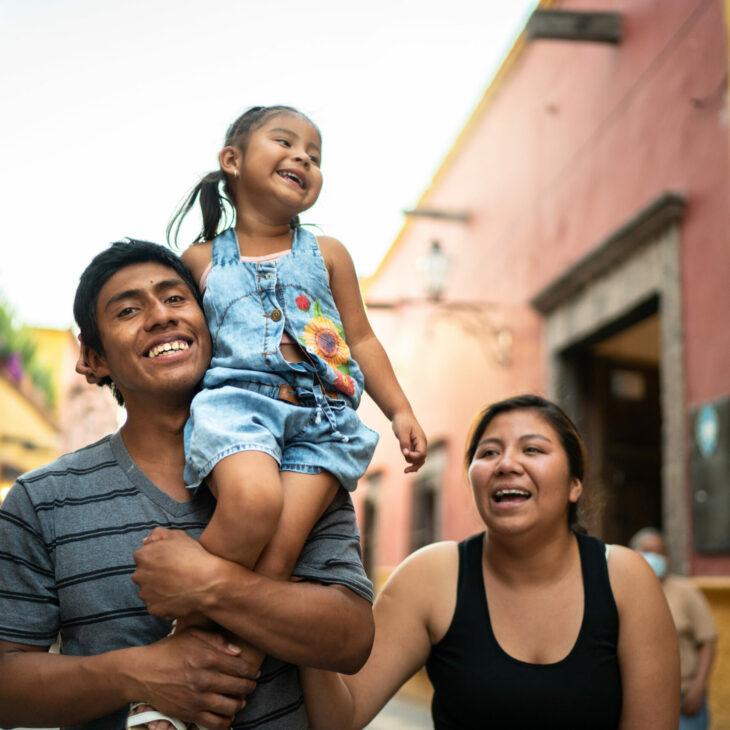How Do We Learn from Others? Embody ‘Cultural Humility’
September 16, 2022

I grew up in a Spanish speaking Assemblies of God church comprised mostly of immigrants from Mexico and a smattering of other Latin American countries.
Growing up in my church contributed a lot to my initial faith development. Many of my early beliefs could be attributed to listening to preachers give sermons about how Jesus Christ died for our sins and believing in Him was the only way for us to get to heaven. I was taught to fear God, as he was a jealous God. This led to my decision to accept Christ as my personal savior as I did not want to be someone who did not get to heaven. I proudly wore the label of evangelical.
As I journeyed in my faith, my views and beliefs have shifted and developed to what they are today. The one constant that has held steady and been made stronger these days is my belief that we are all made in the image of God. To me this means learning to appreciate everyone and all the identities they hold. It also means that I no longer wear the evangelical label and that I have come to believe that I need to be open to understanding and embracing beliefs that are different than mine. How did I get to this place?
During the spring of 2014, I was introduced to the term “cultural humility.” The person who used this term used it in the context of a posture of learning about other cultures and the possibility of using it as a replacement for “cultural competency.” After hearing the term, I wanted to know more about it, so I looked for its origin and discovered that in 1998 healthcare professionals Melanie Tervalon and Jann Murray-Garcia introduced the concept. They presented this concept as a way for healthcare professionals to approach their work with communities of color. They described the idea this way:
Cultural humility incorporates a lifelong commitment to self-evaluation and self-critique, to redressing the power imbalances in the patient-physician dynamic, and to developing mutually beneficial and nonpaternalistic clinical and advocacy partnerships with communities on behalf of individuals and defined populations.
We find ourselves in a moment in history that is challenging us to evaluate our place in conversations about racism, faith, sexual identity, and other difficult subjects. These conversations are happening in the dining room, in Zoom meetings, in community meetings, boardrooms, and places of faith.
Having a posture of cultural humility will help you become more effective because you have an understanding that you are a student. Since diversity, equity, and inclusion are ever-changing, you need to be adaptable. Identities and culture will continue to evolve. This requires a posture that will help us engage in meaningful dialogue, that will assist us in learning from each other and not tearing each other down.
I also believe that developing cultural humility will help you become more comfortable with ambiguity. Since this work continues to change and morph, being comfortable with ambiguity and approaching it with cultural humility will help you be more effective. The goal of being effective in this work should not be a desire to be the expert, but to be willing to continually learn. Cultural humility is counter to our western culture.
Imagine the possibilities if we approached diversity, equity, and inclusion with a posture of humility, looking to understand versus trying to convince the other person that they are wrong. I believe that we would be in a better place and perhaps people would be more willing to learn about the positions we hold versus being defensive of the positions they might hold. We would be able to find common ground so we can work toward solutions in our organizations, communities, schools, and families.
I am not saying that you have to abandon your beliefs or values. What I am saying is that you must have willingness to learn from others. This might mean admitting you were wrong in your understanding as much as it might mean the other person will have to admit the same thing. You may help each other gain an appreciation of the different perspectives you hold.
Having a posture of humility can only help in having conversations around faith and other subjects that we have been conditioned not to talk about. We need to rise to the challenge and be better.
If you want to learn more about how to develop cultural humility you can take my course, “Moving from Cultural Competency to Cultural Humility.” You can find the course by visiting Apoyo Coaching.
Dr. Joel Pérez is owner of Apoyo Coaching and Consulting, LLC and a Professional Certified Coach with the International Coach Federation (ICF). He specializes in career transitions, identity-conscious leadership coaching and coaching professionals that want to develop their cultural humility. He has a certification in the MBTI, Qualified Administrator for the Intercultural Development Inventory (IDI), Gallup Strengths Certified Coach and is a certified coach through the Academy of Creative Coaching. He has over 20 years of experience in higher education, serving in various key leadership roles.
Joel earned a B.S. in Business Administration from Biola University, an M. Ed. in College Student Affairs from Azusa Pacific University, and a Ph.D. in Higher Education Administration from Claremont Graduate University. Connect with Joel on LinkedIn and Twitter @joelperezdp.
Share
Related Articles
American Civic Life
Interfaith Inspiration
Interfaith Inspiration
What Religious Holidays are in April and Why Does it Matter?



